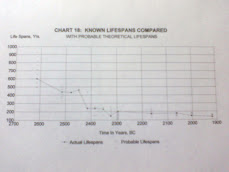
Are you interested in THE AGE OF THE EARTH, DARWINISM, THE HUMAN GENOME, BIBLICAL GENEALOGIES, HARMONIZING SCIENCE AND THE BIBLE? If so, here are some articles that might interest you. I have written a book on this subject entitled "New Evidence for Two Human Origins: Discoveries That Reconcile the Bible and Science." I hope you enjoy this blog which is meant to help us understand ourselves and God's Word. Please return to find new posts. Your comments and emails would be greatly appreciated.
Wednesday, July 21, 2010
QUESTIONS FOR THOSE WHO BELIEVE IN A YOUNG EARTH
Revised June 14, 2014
1. If the Bible is supposed to teach that the creation days are only 24-hours long, why does Genesis 2:5 say the land was not yielding vegetation because there was no rain? This was before the creation of Adam and Eve and four days after the water was taken from the land. How could you expect to have vegetation this soon and wouldn’t the land still be wet from the water that just ran off of it four days before?
2. If Adam and Eve were the people who were created in Genesis 1, why does the Bible teach that these people were to be scavengers (v. 29) while Adam and Eve were apparently farmers? (Gen. 4:2)
3. If the earth is young, why does Genesis 2:4 say that those whose creation was recorded in Genesis 1 are the generations (meaning descendants) of the heavens and the earth? Adam was created directly out of the ground by special creation. Adam and Eve must be the beginning of a new race created in a different manner.
4. If the creation days are twenty-four-hour days, why does the Bible have them ending in the morning? (Gen. 1:5) The Hebrew twenty-four-hour days ended in the evening.
5. If God created and called the day light “day,” why did He then define the period of time to the following morning “one day”? The author here was defining some period of time as a “day” or else he would not have used the expression “one day.” He would have used “day one” or “the first day” as he did throughout the rest of Genesis 1. Since he is not defining the day light period that he just named and he was not defining a twenty-four-hour day, which ends in the evening, he must have been defining a creation day.
6. If the creation of Adam and Eve directly out of the ground in Genesis 2 describes the same creation as does Genesis 1, why does the Hebrew conjunction of Genesis 2:5 indicate that we are moving on in time. In Hebrew narrative we need to conclude this unless the author gives a good reason to believe that this is not the case.
Please see chapter 10 of my book New Evidence for Two Human Origins: Discoveries That Reconcile the Bible and Science.
1. If the Bible is supposed to teach that the creation days are only 24-hours long, why does Genesis 2:5 say the land was not yielding vegetation because there was no rain? This was before the creation of Adam and Eve and four days after the water was taken from the land. How could you expect to have vegetation this soon and wouldn’t the land still be wet from the water that just ran off of it four days before?
2. If Adam and Eve were the people who were created in Genesis 1, why does the Bible teach that these people were to be scavengers (v. 29) while Adam and Eve were apparently farmers? (Gen. 4:2)
3. If the earth is young, why does Genesis 2:4 say that those whose creation was recorded in Genesis 1 are the generations (meaning descendants) of the heavens and the earth? Adam was created directly out of the ground by special creation. Adam and Eve must be the beginning of a new race created in a different manner.
4. If the creation days are twenty-four-hour days, why does the Bible have them ending in the morning? (Gen. 1:5) The Hebrew twenty-four-hour days ended in the evening.
5. If God created and called the day light “day,” why did He then define the period of time to the following morning “one day”? The author here was defining some period of time as a “day” or else he would not have used the expression “one day.” He would have used “day one” or “the first day” as he did throughout the rest of Genesis 1. Since he is not defining the day light period that he just named and he was not defining a twenty-four-hour day, which ends in the evening, he must have been defining a creation day.
6. If the creation of Adam and Eve directly out of the ground in Genesis 2 describes the same creation as does Genesis 1, why does the Hebrew conjunction of Genesis 2:5 indicate that we are moving on in time. In Hebrew narrative we need to conclude this unless the author gives a good reason to believe that this is not the case.
Please see chapter 10 of my book New Evidence for Two Human Origins: Discoveries That Reconcile the Bible and Science.
Subscribe to:
Post Comments (Atom)





No comments:
Post a Comment
I welcome your comments. Feel free. However, I have set this blog so that I may see comments before I appprove them for publication.